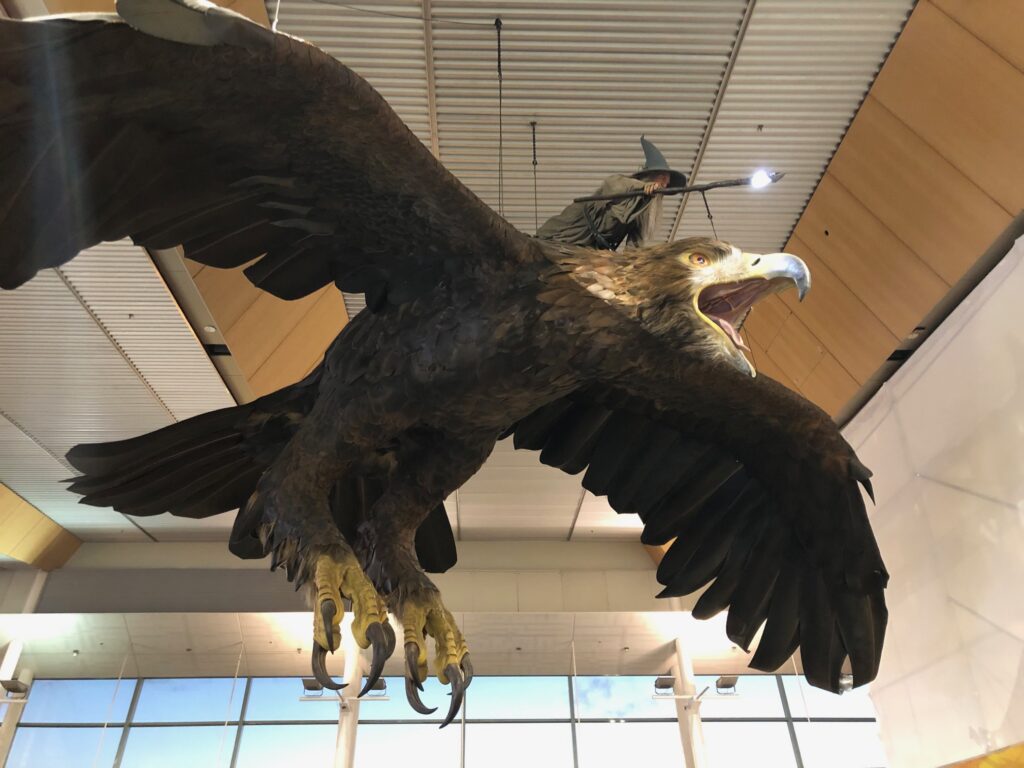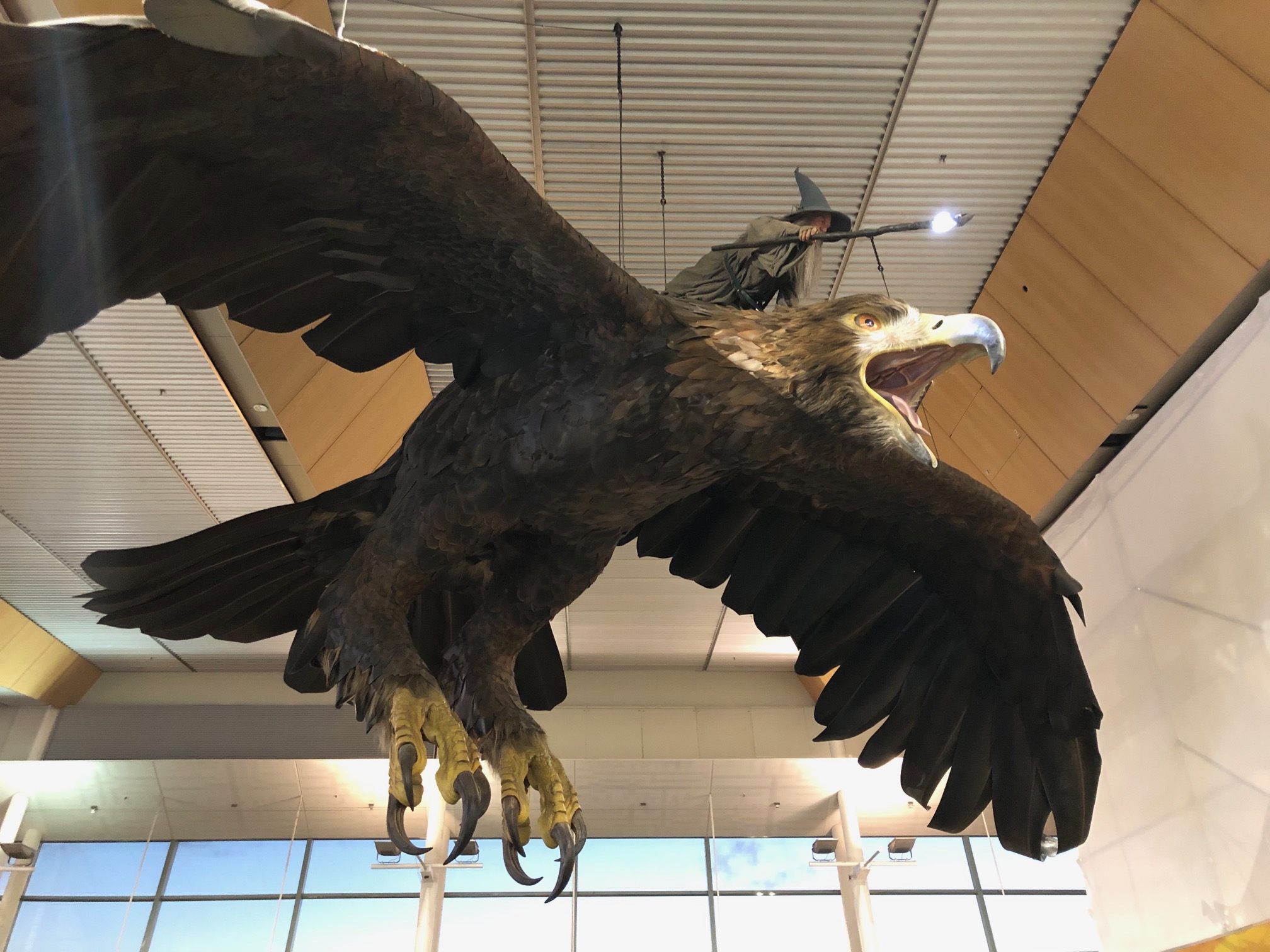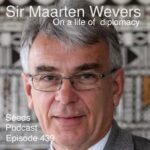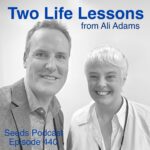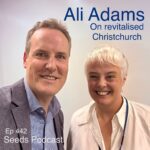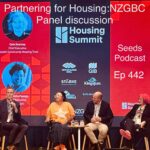“To go fast, go alone. To go far, go together”
Returning from a conference it is always important to reflect on some of the themes and key learnings while they are fresh. I’ve just come back from three days at Te Papa with around 500 attending the biennial Philanthropy Summit 2019 which is organised by Philanthropy New Zealand.

Intro
In this post I am going to explain which sessions I attended at the conference (info here) and set out any key learnings from that. Perhaps the particular stream of which of the four workshops I chose and what I took from some of the keynotes will even help others who attended and went to different sessions. Also, I am linking within this post any of the content I recorded (with permission) so that others can benefit from it even if not there …
Just a side note before we dive in, regarding making content available, I have been challenged by Kaye Maree Dunn recently from Āhau who asked in a Korero here, “So, who is not in the room??” – when we are having our discussions and conferences this is important to ask – and the follow up is how can we at least make content more accessible to those who are not able to attend for whatever reason. I’ve been hosting a podcast called seeds which has more than 100 episodes and just hit 32,000 listens overall (and the other day was a high point of 308 listens in 24 hours – it is growing as people spread the word!). So this is a platform using technology for empowering the spread of information and has many interviews with inspiring people as well as challenging content to help build up the ecosystem of knowledge here in New Zealand. You can find out more about it by clicking on the links at this seeds page above (its also in podcast apps or you can listen online at this site). Where I recorded a session on video have added those links too. (As a side note, have you thought of starting a podcast? I explain how here).
Conference Overview
The theme was “The Future of Trust” and the conference was organised by Philanthropy New Zealand with 19 sponsors such as AMP Capital (and a big shout out to Rebekah Swan and Emily Woodland who invited me along). I enjoyed attending the conference because it got me out of the silo of only being with other lawyers or professionals – there were few of those here. Instead, those in attendance were mainly from large and small Community Trusts, private family foundations as well as people on the ground working in a variety of charities and social enterprises. Keynote speakers included Sir Stephen Tindall and Dr Jane Goodall – there were 9 key notes in total. There were also many workshops with 4 sessions of breakouts and 8 running at each for a total of 32 sessions. I counted in the program at least 140 different speakers who were involved in delivering content and there were around 500 who attended. I don’t mention each key note below as there were so many and also, clients seemed to have work they needed done even while I was there – so I could not get to everything!
The event was curated well with a particularly noticeable and really beautiful strand woven through of Te Ao Māori that went beyond mere tokenism – for example, not only did key note speakers have a song sung for them when they finished, some of the topics tackled were thorny and not easy to grapple with (such as one key note “Undoing colonialism to do good: building constructive relationships between philanthropy and tangata whenua”). That session (discussed below) really raised the difficult – often ignored – issues around the current state of our society. Just having a welcome and some words in Te Reo would not have gone deeper and challenged our thinking.
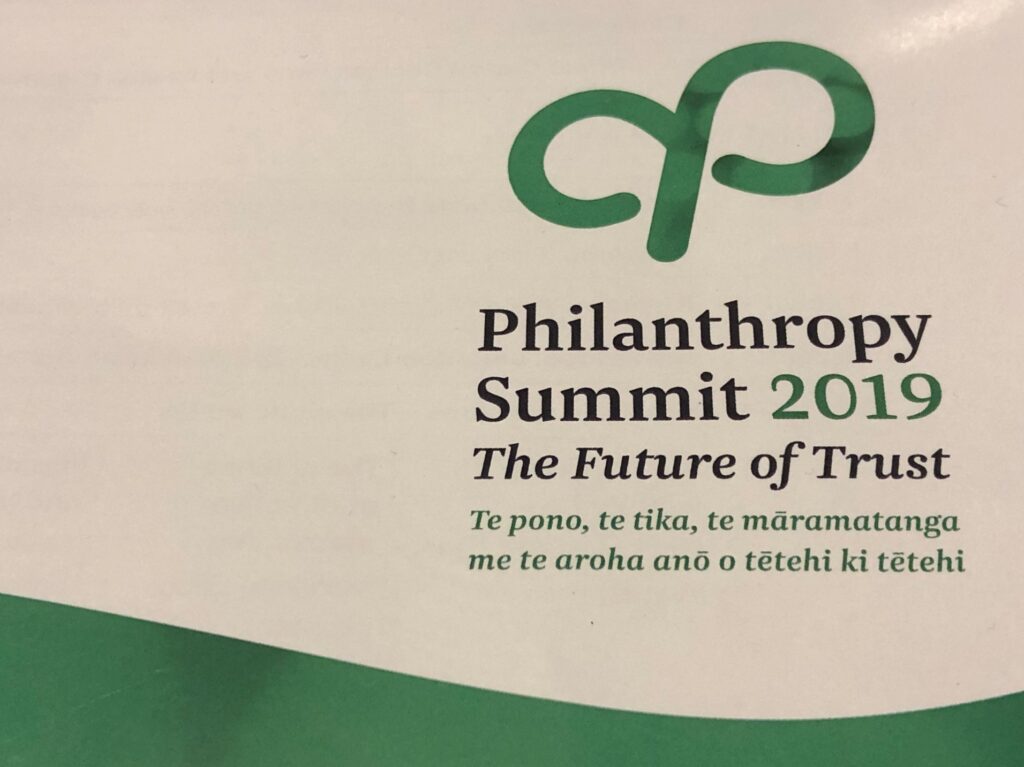
My hat is off to all of the volunteers and organisers led by Sue McCabe and Yvonne Trask and many others. These events take a lot of mahi – the content described below is good but just as important are the connections made over coffee or lunch, collaborations started and ideas shared that may only have measurable ripples some years in the future. It is possible that thought leaders in an area have connected with others and through challenges received each of their research and understanding will go deeper. The “vibe” in the room was not one of white privilege giving out grants – instead questions were being asked of how change can be empowered and enabled at a structural level and new ways of thinking about philanthropy encouraged – both from a Te Ao Maori perspective as well as looking to the next generation and harnessing their ideas and at the same time recognising the diverse ethnic and other communities in Aotearoa.
The Themes
As a way to break down the main theme of “The Future of Trust” there were many breakout sessions that you could choose from often centred around the following four themes:
- Future trends in Philanthropy: What changes are coming?
- Building trust: engagement and relationships and how to build them to in turn build capability
- The work we do: the “how-to” and a focus on the practical side to enable bigger change
- Impact: what difference are we making and how do we know?
Dinner: Disruption, technology and the future of Philanthropy
First up for me was a dinner hosted by Sam Stubbs from Simplicity. This was an intimate discussion over some really good food with the focus on disruption and technology and how it is changing the face of philanthropy – and how it might change even more. Sam explained how Simplicity works and how it would not have been possible even a few short years ago. Operating a Kiwisaver scheme where a large amount is given away to charities is a unique business model for sure. We had an interesting debate about whether they are a social enterprise or not, probably concluding that the terms fade in importance when what you ultimately need to consider is “impact” and how it is reported on – the word I am hearing more and more these days (and using myself!). I encourage you to check out what they are doing as they are seeking to disrupt the traditional banking models and drive lower prices for consumers while also doing good. It was an engaged group and there were many views expressed!
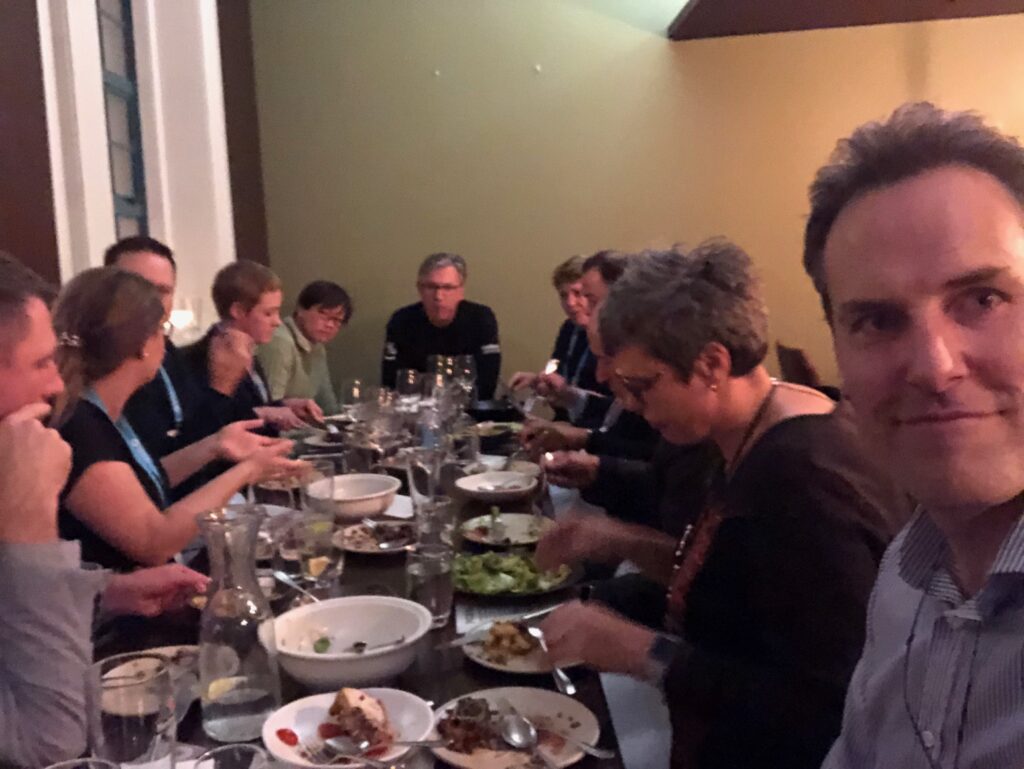
Key discussion points and themes
- The next generation is not trusting institutions and looking for online recommendations/social media guidance – threat and opportunity;
- Consumers have desire to do good with their dollar and technology enables them to do that;
- What form does new reporting take on impact?;
- Is there a new paradigm coming where business itself is transformed into a force for good (see Akina report “Structuring for Impact” released in April here and discussed in detail here – full disclaimer, I helped out on the report!).
- Is social enterprise an intermediate bridging step between an old paradigm of thinking (you either do good with charity, or make profits with business) into a new paradigm (a focus on combining both purpose and profit to have greater impact)?
- If so, what does that mean in terms of giving out grants (old model) vs making impact investments (new model)?
Key note: “The future of people, planet, money and technology”
The next morning the first keynote discussed “The future of people, planet, money and technology”. There were four speakers who provided different perspectives on each aspect of that. An interesting perspective was provided by Matthew Monahan who had sold his tech start-up in America and moved to New Zealand several years ago. He talked about his philanthropy journey and helping set up the Edmund Hillary Fellowship here. Each of the other speakers (Rod Oram, Shamubeel Eaqub and Tahu Kukutai) shared their concerns about the state of our world and the need to take action individually and collectively if we want to halt the big issues facing us of climate change, economic disruption and relations between Maori and Pakeha.
Key discussion points: We have the data, we know the state of issues like climate change – what next? Do we inherit the planet from our parents, or hold it as guardians for our children?
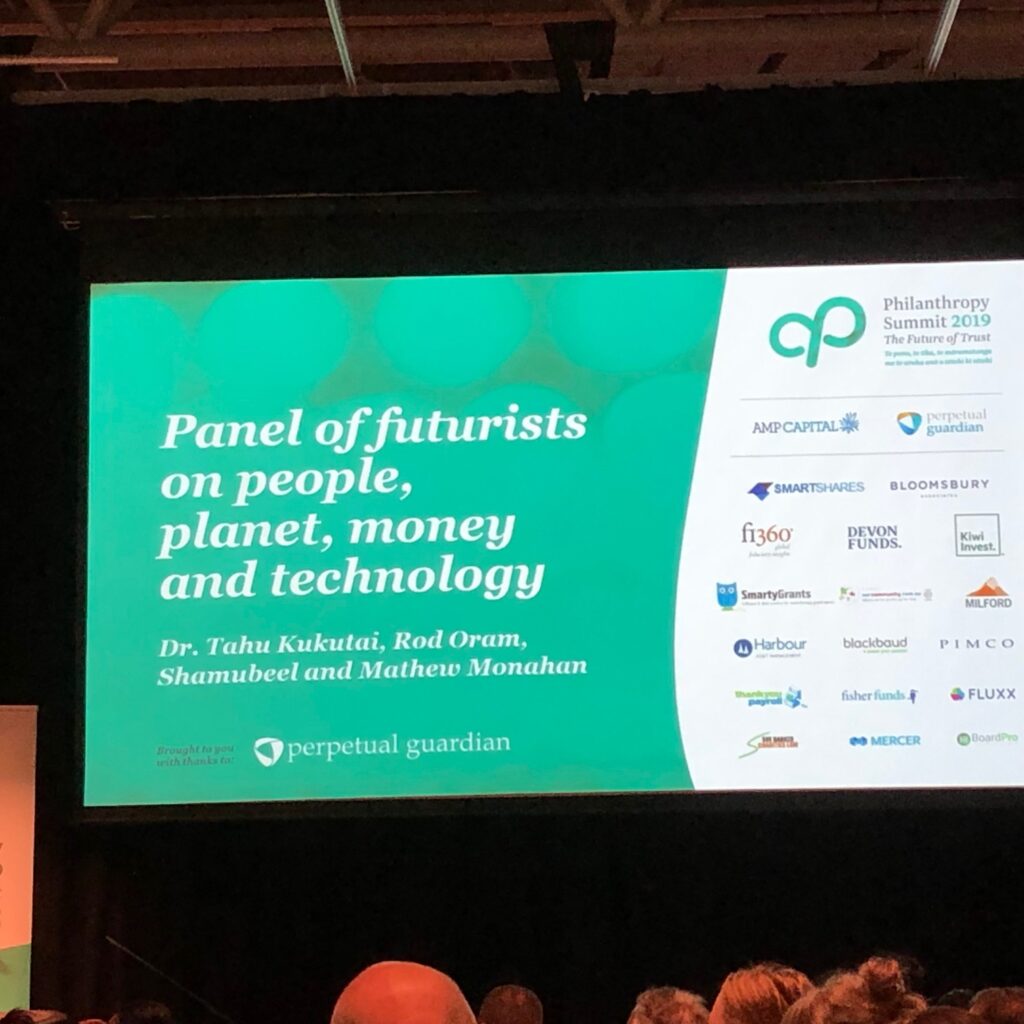
Brave ideas
Interspersed through the days were 5 minute talks which provided short challenges. These were:
- Lani Evans from the Vodafone NZ Foundation: Declaring our intentions and launching the NZ Youth Accord – see www.nzyouthaccord.org
- Manaia King and Chelsea Grootveld from JR McKenzie Trust: On Internatioaln Funders for Indigenous People
- Sam Stubbs from Simplicity on whether companies love their shareholders more than their community
- Leighton Evans from Rata Foundation on the idea of a tradeable impact investment market
- John McLeod from J B Were on the changing shape of giving in New Zealand.
The talks by Lani, Sam and Leighton may be put up as a short podcast episode on seeds in the near future so be watching out for that…
Breakout 1: Investment trends and the case for impact investing
This whole breakout has been released as a seeds podcast bonus episode here because I thought the content was great and deserved to be heard by more than the almost 100 or so in the room on the day.
Description: This workshop will provide insights into the future of investing, and will pay particular attention to the role of Responsible Investing generally and impact investing in particular. The workshop will be interactive and will provide practical advice and useful insights for everyone with an interest in future-focused investing.
I was fortunate enough to be able to help out with facilitating the Q&A session here and really enjoyed that. Prior to that the four speakers, Rebekah Swan, David Woods, Emily Woodland and Clive Pedley had shared their perspectives on investment trends when it comes to impact investing. If this is of any interest then suggest you listen to the podcast episode.
Key themes and questions:
- how do you actually measure “impact” across diverse sectors and drivers;
- how you report on it – what shape will reports in the future take and will their be standards of how you talk about impact?
- What due diligence is needed into an entity beyond the usual financial checks when you are also concerned about impact?
- How do you build a community of investors who are willing to think in this way and could there be co-investment opportunities?
Key note: Undoing colonialism to do good: building constructive relationships between philanthropy and tangata whenua.
This was a two part session with Ani Mikaere (Te Kahui Whakatupu, Te Wananga o Raukawa) and a response to her talk from John McCarthy (The Tindall Foundation). Probably one of the most challenging sessions the questions being asked were cutting to the heart of our society and asking if we are perpetuating colonialism. At a personal level the challenge to me was to think more deeply about my attitudes and whether I am truly seeking to know and understand the perspective of others. For example, do I suggest that the headings in a document be translated into Te Reo when nothing else will change about the organisation? How do we deepen the engagement and willingness to listen closely and what does that mean practically? Those were some of the questions that surfaced for me while listening to this talk.
John McCarthy from The Tindall Foundation gave a response to the talk from Ani which showed that he had been grappling with similar questions in his role. I spoke to John afterwards and learned that they have been having someone come in every two weeks or so to provide guidance and training in both Te Reo but also the culture so that it can be better understood among the staff. A great idea.
Key themes and questions:
- How much do we each know about the past and have we thought about what the implications are for the present?
- What does meaningful engagement look like and what shape does that take?
- How do we move beyond tokenism and strive for deep engagement?
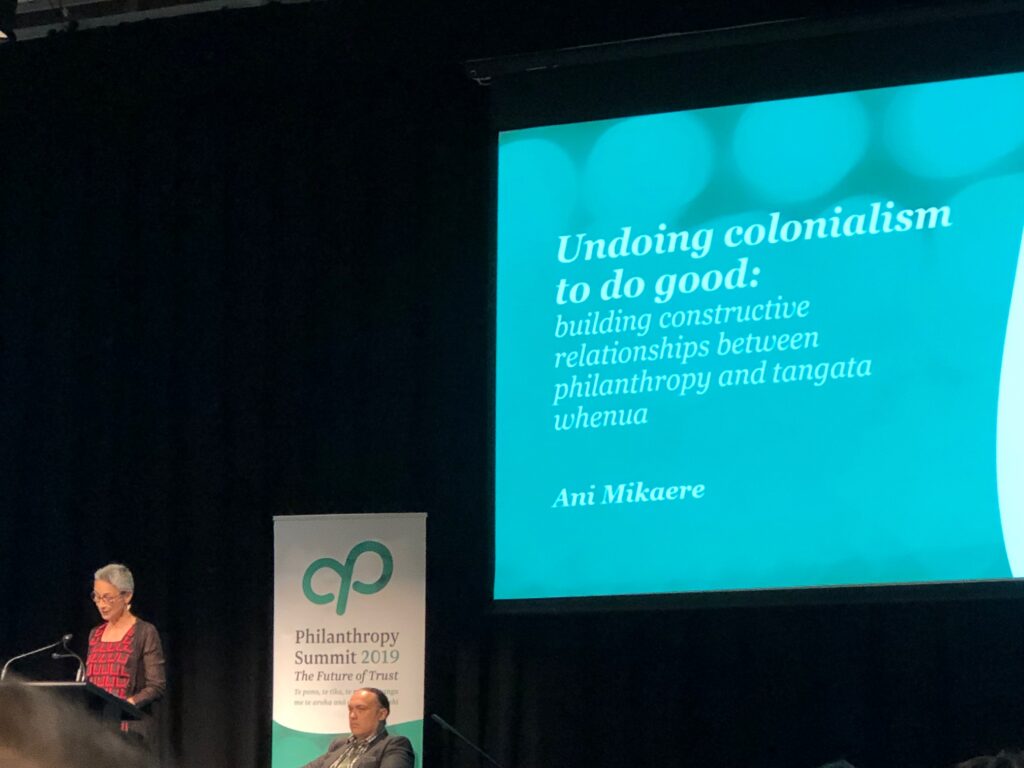
Breakout 2: Bridging the generational divide to redefine philanthropy
This was a fun session with four young people who have each started their own charities/businesses or gotten involved in some way with movements that challenge the old ways of thinking. The description of the session was:
Millennials are doing things differently, redefining generosity, disrupting traditional models with radical collaboration, harnessing technology and social capital to drive positive impact. But how can we work together better across generations? We know there are challenges from succession planning, to funding youth-led change. Share your questions, concerns and opportunities leading us to find common ground so that together we can re-define philanthropy. We know you’ll leave with golden nuggets to take action on!
This session was recorded on video here.
It will also be released as an audio episode of seeds soon.
Key themes and questions:
- how do you transfer wisdom between generations – is it a baton passing? Is it another wave rolling in? Do you reinvent / disrupt the old ways or adapt the old and combine with new thinking?;
- how do you identify and encourage those young people with skills coming up and give them opportunities for leadership – and potentially failure too – so that they can learn and grow;
- what does the next generation need, particularly millenials, who may want to be fluid with how they use their time and what they are supporting
Breakout 3: Funding for systems change
Description: Systems change is a new way of understanding and taking action to create positive change for communities, countries and the planet. In this session, we’ll explore what systems change is and why funders are looking to support this new approach. We’ll also look at what it takes to move from being a traditional grant maker to an enabler of systemic change, with practical insights from both funder and practitioner perspectives.
This session was a frank and honest look at systems change – are we at the bottom of the cliff or are we at the top, trying to change the causes of the problem? The honesty of Christina Howard from The Todd Foundation and Gael Surgenor from Auckland Council about what has worked and what has not was helpful. They shared about their own experiences and the approach which each of their organisations has adopted. In particular the changes at The Todd Foundation to alter the funding model was helpful as she described systemic and collaborative approaches to creating change.
This session was recorded on video and will put out in the future so watch out for that.
It will also be released as an audio episode of seeds soon.
Some of the key slides probably explain best what they talked about – here are some photos of those.
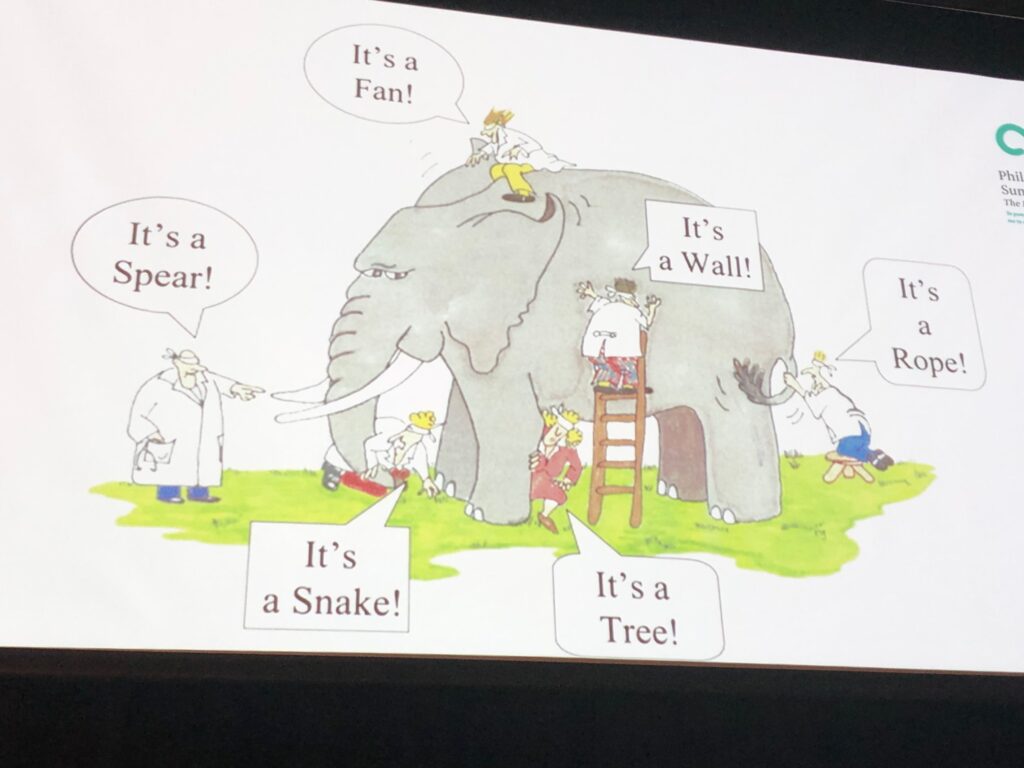
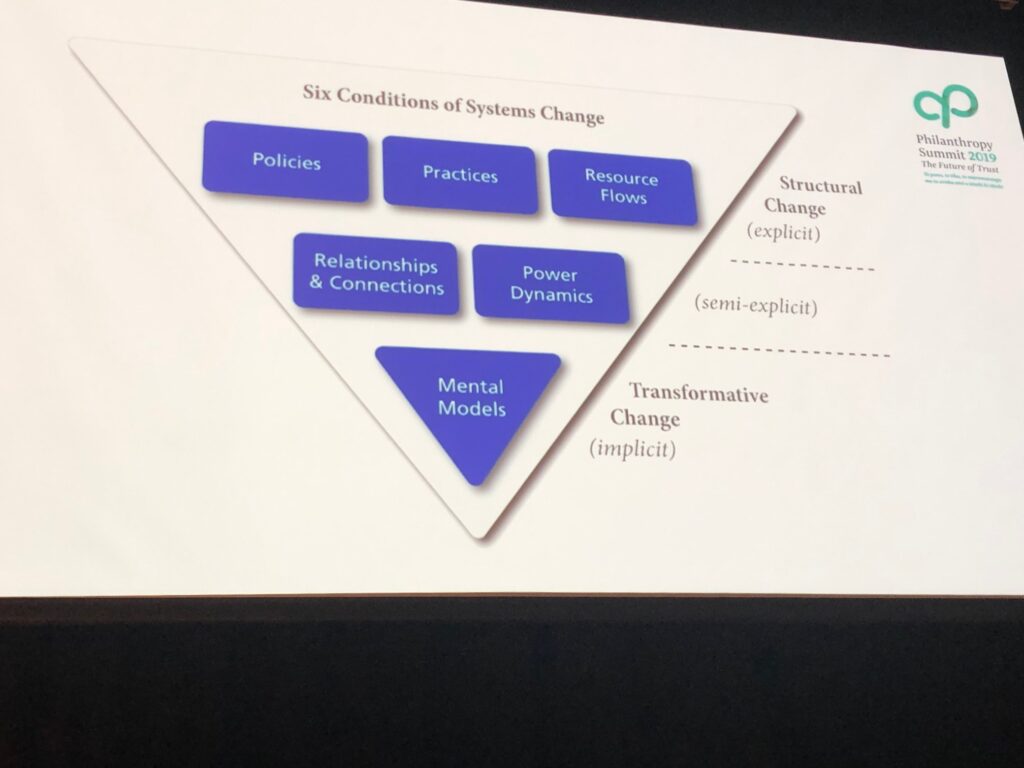
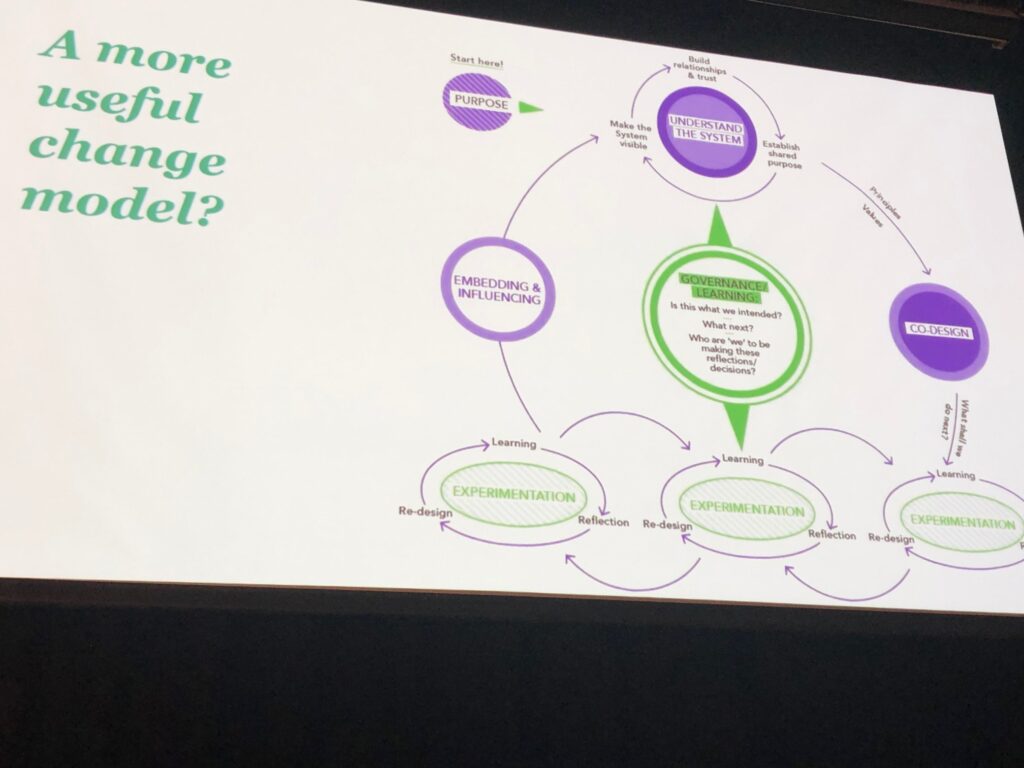
Key themes and questions:
- How do funders fund – what is the priority?
- What role does procurement play in the process for large organisations, and what greater role could it play?
- How do you go about rethinking systems that have been in place for a long time and implementing change?
- The world is complex and the most pressing problems are not easy to solve
- There are no super heroes or silver bullets
- Individually focused and unconnected solutions aren’t going to create change at scale.
Keynotes about Turangawaewae and finding a place to stand
There were two sessions again here and we heard from Mary Ann Thompson-Frenk, which was interesting. We then heard from Anjum Rahman from the Islamic Women’s Council of New Zealand and she gave some real challenges about the place in society for ethnic minorities and the hard fight it is to be recognised. Some of the statistics she shared about the Muslim community were enlightening, such as the high proportion of young people that make up that community and the implications that result.
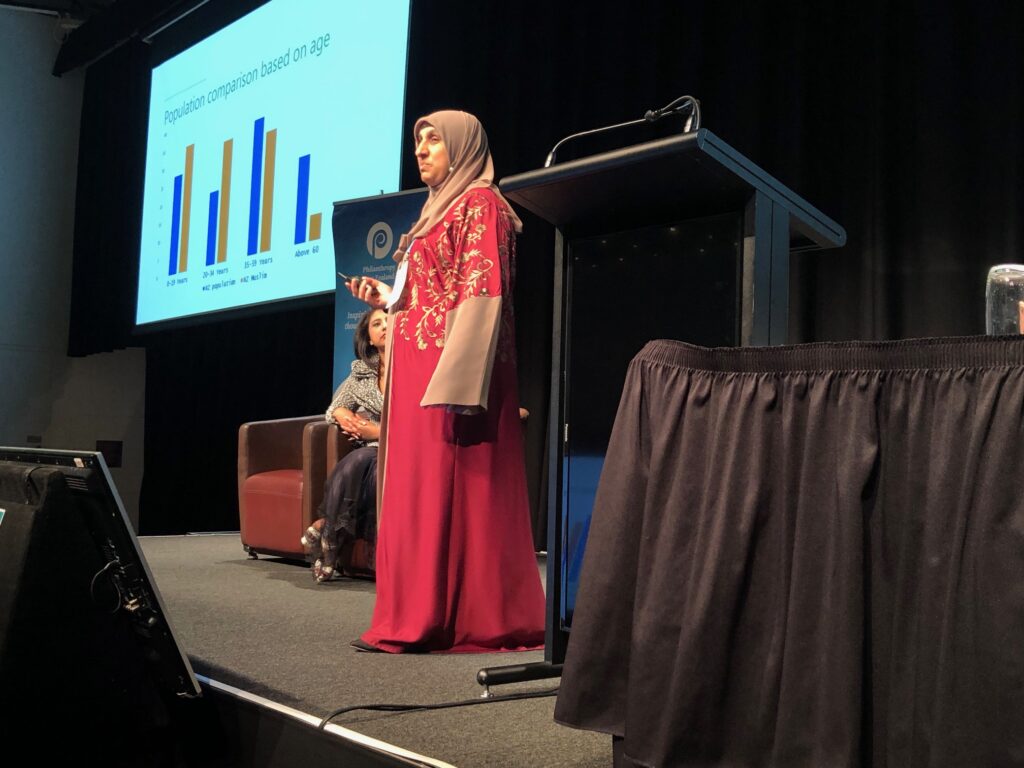
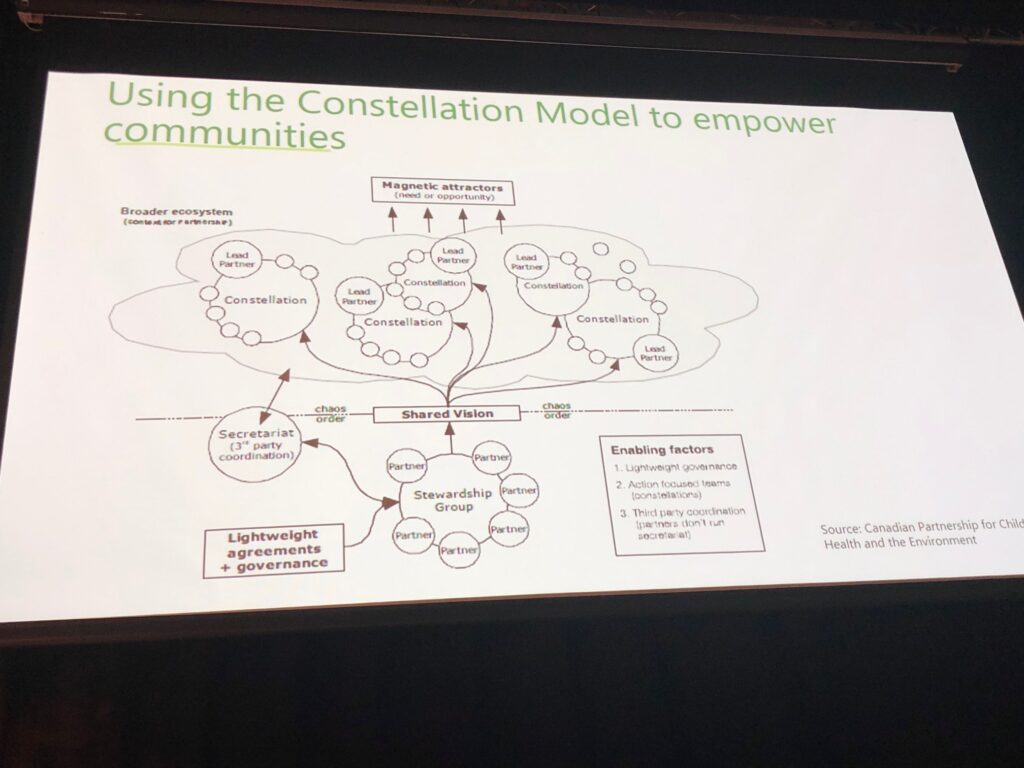
Breakout 4: Transforming to a human economy – the future of business
This was a session which I really enjoyed because it is a topic very close to my own work as a lawyer focussed on empowering impact. I assisted with the recent report from Akina Foundation about the future of business in New Zealand which Louise Aitken spoke about so it was great to hear her reflections that report and the state of play. That whole report has been recorded as an audiobook for seeds here. The main idea is that in the past we have focused so much on figures and GDP and profit we have ignored other important things that become apparent when we focus on the “human economy”. What might that mean for the future of business?
Description: The role Philanthropy can play to transform the traditional role of business to be more impactful. Understanding the future of business through examples of social enterprise. Come and learn more how impact is valued in the economy. Participate in a hands-on discussion to understand what opportunities funders have to contribution to this evolution of business and how to value the impact.
This session was recorded on video here.
This is the session as an audio episode on seeds podcast:
Key themes and some questions:
- How is impact valued when it is beyond dollar figures and instead is resulting in social/environmental change?
- What do we really mean by the human economy and how does this tie in with the Living Standards Framework (our superpower?) now being discussed by Treasury?
- What will business look like in the future – perhaps one where mission driven organisations are encouraged and thrive?
- What are the key obstacles facing social enterprises today and how could they be removed?
- What role does procurement play when bigger corporates make decisions, and what is the new initiative ‘fwd’ which has been launched by the Akina Foundation – a supply chain for change – check it out here (shout out to Sean Barnes, great work).
Keynote: Jennifer Gill
Jennifer Gill is retiring from her role as CEO at Foundation North so she shared about all the changes she has seen in that time. I really enjoyed hearing her reflect about her journey and the people who have helped along the way. This was a short 15 minute talk but it was encouraging to hear about someone else’s journey who has been involved in the sector for so long.
I will see if I can get her permission to release the talk as an audio episode of seeds.
Keynote: Dr Jane Goodall
Obviously it was amazing to listen to one of the most famous people on our planet – particularly someone who is famous for the right reasons of wanting to preserve and protect our world. She shared many excerpts from her life story and I particularly liked these statements:
- How is it that an intelligent species destroy its own home?
- We haven’t inherited the planet from our parents, we’ve borrowed it from our children
- Something might go wrong in your life – but don’t give up
- Together we can, together we will.
It was wonderful to hear her insights and was a real highlight of the conference to finish off.
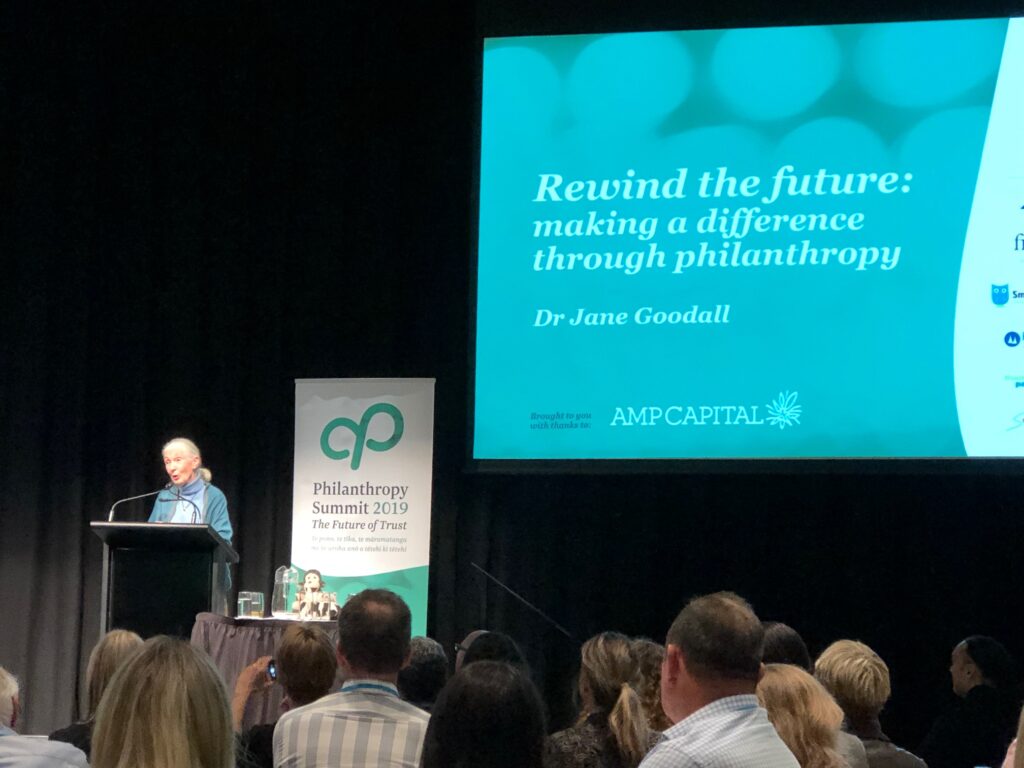
Conclusion
This sort of event is likely to have ripples that flow out from it that will not be seen for years to come. It will be interesting to watch what comes about as a result of the connections that were made. I know in my case it felt significant to be there because I was particularly challenged to (i) avoid tokenism in my actions and seek to understand more deeply other perspectives and (ii) continue to work long and hard for the betterment of this country we live in, knowing that there are others working just as hard in other spheres as well. That was encouraging.
To finish, two proverbs that were mentioned towards the end stood out:
- You must all paddle together to move in the same direction
- “To go fast, go alone. To go far, go together”
And so, like Gandalf I found myself at Wellington airport and it was time to fly home while remembering… “all we have to decide is what to do with the time that is given to us” . . .
